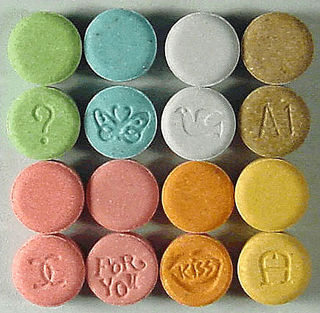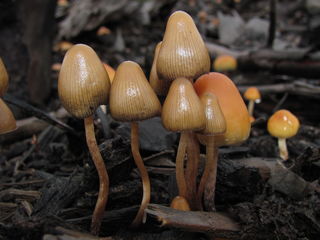Sex
Open Your Mind: Merging Psychedelic Therapy with Sex Therapy
Psychotherapist reveals advances in psychedelic research and sex therapy.
Posted October 24, 2017
Dee Dee Goldpaugh, LCSW is a psychotherapist in private practice specializing in compassionate, sex-positive psychotherapy with LGBTQ and polyamorous individuals and couples/multi-partner relationships. Dee Dee also has specialized expertise and interest in working with adult survivors of sexual abuse and assault. Last year she presented a workshop for NYC's Sexuality Speaker Series on "The Therapeutic Use of Psychedelics in Treating Sexual Dysfunction and Trauma," which can be downloaded here for Continuing Education credits. She is appearing later this month, on October 26 at the Center for Optimal Living, discussing integrating sexuality through multiple facets of the psychedelic experience. Please note: The use of psychedelics outside of FDA-approved research is currently illegal. This interview and referenced workshops only discuss legal research and its ramifications.

Q: Your presentation discussed the possibility of healing sexual trauma through something called "psychedelic therapy." Indeed, through organizations such as MAPS, there has been renewed interest in research on the therapeutic potential of psychedelics. Could you briefly describe what you mean by psychedelic therapy?
A: Currently, there are several major research institutions in the US and around the world including Johns Hopkins, NYU, and Imperial College London as well as organizations like MAPS who are exploring the therapeutic potential of psychedelics particularly as a means of addressing treatment-resistant conditions such as PTSD. In these studies, selected candidates receive short-term, focused therapy and then a limited number (usually one or two sessions) using a psychedelic such as psilocybin (mushrooms) or an entheogen such as MDMA in the presence of a trusted therapeutic guide. What we are seeing, again and again, is that the combination of targeted therapy, a controlled clinical environment with experienced guides who have built trust with the clients, plus the use of a psychedelic substance produces extraordinary results.
In the case of MAPS studies with MDMA, which is now in Phase 3 of clinical trials and has achieved “breakthrough drug status,” the last barrier before MDMA will potentially be available in clinical settings, 83 percent of those who participated in the study no longer met the criteria for PTSD and the benefits were maintained over time. To contrast, in the largest published study for PTSD that uses Cognitive Behavioral Therapy more than one-third of the patients dropped out, the rest had a significant number of adverse reactions. Most of the women in the study had full-blown PTSD after three months in the study and only 15 percent no longer had PTSD symptoms. It’s very important to note that these incredible findings relate only to the results of a psychedelic taken in a controlled clinical environment. Not “recreationally” in an unmonitored environment.
It’s also worth mentioning that since psychedelics are only legally available in these restricted settings with FDA approval, a small, but growing, number of therapists like myself are offering Psychedelic Integration Therapy specifically meant to assist people in applying their insights in the psychedelic experience to their lives. While I never direct any client to take an illegal substance, more and more people are undertaking, for example, retreats in Peru and other countries where medicines such as ayahuasca are legal. The experience can be life-changing and profound, but also at times intense and difficult. Integration work can help participants find useful ways of processing and applying what they learn from psychedelics. It’s also important to say I never encourage clients to break the law or give psychedelics to clients. This is why advocacy for rescheduling so these substances can be used legally is so important.

Q: This is not the first time that psychedelics have been considered as therapeutic adjuncts. Can you tell us a little about the history of psychedelic therapy and why it all stopped abruptly in the late 60s and early 70s?
A: In 1938, Albert Hoffman synthesized probably the most famous (and infamous) of psychedelics, LSD, and discovered it’s hallucinatory properties in 1943. In 1955, Gordon and Valentina Wasson traveled to Mexico and met the storied medicine woman, Maria Sabina, and introduced psilocybin mushrooms to the Western world. Psychologists were, of course, fascinated by these substances and carried out fairly broad and loosely controlled research throughout the 40s, 50s, and 60s. In fact, between 1953 and 1973, the federal government funded 116 studies of LSD alone, involving more than 1,700 participants. While some of this research was highly meaningful and useful to our knowledge of psychedelics today, there are also noted instances where research findings were not presented honestly and research carried out in unscrupulous ways. However, it was really the explosion of the counterculture movement of the 1960s and the public presence of figures such as Timothy Leary, who, by the way, was an esteemed Harvard professor and researcher, that tarnished the reputation of psychedelics as contributing to the fraying of the very fabric of society. In 1970, Richard Nixon signed the Controlled Substances Act and put most psychedelics on Schedule 1, prohibiting their use for any purpose. This brought promising research to a halt. It wasn’t until the 1990s that we see the first studies begin to get quietly underway again paving the way for the renaissance of psychedelic research we have today.

Q: Apparently, MDMA (Ecstasy) was used experimentally in couple's therapy in the 80s. MDMA research is now making a comeback. How do you propose that MDMA could specifically be used for sex and/or couple's therapy if this form of treatment is FDA approved sometime in the future?
A: MDMA was first synthesized in 1912 for Merck, but it was in the 1970s that Alexander “Sasha” Shulgin resynthesized the substance and discovered it’s potential as a therapeutic aid due to its effects of creating deep feelings of empathy and interconnection with other beings as well as feelings of love and compassion for the self. Therapists began to quietly use it in couples therapy since it was an unscheduled substance at the time. So, we have decades of evidence and practice to suggest that MDMA can be safe and effective in therapeutic settings. I believe that MDMA could be used in sex and couples therapy because it’s highly effective in reducing and eliminating PTSD symptoms with very limited duration of treatment for clients who are survivors of assault or childhood sexual abuse. It induces extremely pleasurable sensation in the body allowing clients to feel being fully “embodied.” It increases empathy and reduces shame, facilitating clients to experience their body as a safe place to be. In couples' work, we have evidence to suggest that MDMA can assist couples in communicating with each other in an unguarded way and to hear and hold their partner in a manner impossible to them when coming from a place of fear or defensiveness.

Q: You propose that psilocybin could also be used for sex therapy. How so and what is the mechanism through which psilocybin could prove therapeutic for sexual concerns?
A: The current research on psilocybin is so promising. While there are no studies that look directly at the possible impact psilocybin might have on sexuality, research suggests to me that there might be several applications in sex therapy. Psilocybin has been shown to reduce or eliminate entirely existential anxiety and distress and increase openness (defined as an increased capacity for fantasy, appreciation of aesthetics, feelings and increased tolerance). My friend and colleague Dr. Katherine MacLean, a research scientist who has studied psilocybin extensively, was able to show that even a single session with psilocybin that occasioned a mystical experience in the user could change personality traits instantly and more profoundly than occurs over a decade of time in an average adult. Given my knowledge of this research and my own sex therapy work, I believe psilocybin can assist with body image issues, sexual performance-related anxiety, and feelings of shame. Clients may experience a sense of entitlement to pleasure and experience an increased ability to be present with pleasure.
Q: You suggest that in the future, psychedelics could be used to treat not only sexual trauma survivors but sex offenders as well. How do you imagine that would work?
A: I do believe we can use psychedelics to treat sex offenders and believe me, when I mention it to people it’s a controversial opinion. I believe we do a terrible job at rehabilitating those who have committed sex offenses in the US. Clinical evidence suggests that psychedelics can occasion genuine, lasting personality change and also engender deep feelings of empathy and interconnection with others. I wonder if they could reduce instances of abuse and assault if integrated into our culture or used in therapy with offenders? Could they foster empathy in those with pathological deficits in empathy? I came across a New York Times article in 2015 about a Brazilian group that was using ayahuasca in prisons in the belief that drinking it would lead to healing and the ability to confront oneself and the crimes they have committed. And it seems to work.
Q: You believe that a spirituality component is missing from contemporary sex therapy practices. Why do you think that is important and how would psychedelics help?
A: I think as therapists we are often dissuaded from discussing spirituality as a facet of sexuality unless we are dealing with the consequences of religious shame. I encourage clients to first define what spirituality means for them free from the structures and religious trappings they grew up with, which are often very sex-negative. For me, spirituality encompasses a personal connection with a universal principle that facilitates a sense of meaning, interconnection of all people and phenomenon, ecstasy, and universal love. I believe that psychedelics can give people a direct felt experience of something greater than themselves. If we can use that experience to reduce inhibition and shame and encourage a view that we have a sacred right to erotic pleasure, that would be a tremendous gift to our clients.




